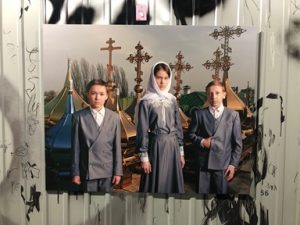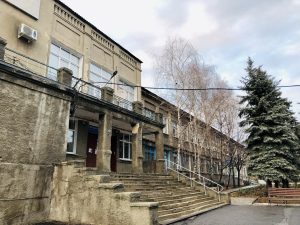In Transition: Rupture and Loss in Contemporary Ukrainian Art. The Case of IZOLYATSIA
The postdoctoral research project is carried out at the Davis Center for Russian and Eurasian Studies, Harvard University, and the Institute for East European Studies of the Freie Universität Berlin
Supervisors: prof. dr. Susanne Strätling (FU Berlin), dr Alexandra Vacroux (Harvard)
IZOLYATSIA. Platform For Cultural Initiatives (IZO) was based at the site of a former insulation factory in Donetsk (Ukraine) and took its name from the original manufacturer. In June 2014 IZO was seized by the armed forces of the Donetsk People’s Republic, an event that forced the foundation to relocate to Kyiv. The site was turned into an illegal prison and filtration camp. In 2021 IZO’s managers decided to go back to Donbas and open its new headquarters in Soledar, a small city of the salt mines. On the 24th of February 2022, the Russian Federation started the full-scale invasion of Ukraine, leading to the almost full destruction of Soledar. I propose to analyze IZO as an institution that emerged from Donbas and was exiled from its homeplace. Recognizing the crucial role Donbas plays in (inter)national imagery of contemporary Ukraine, I aim to analyze the activity of the center which refers to its post-industrial setting in the heart of Donbas, and which mission, goals, and programming evolved drastically due to the political situation in the country. The tragedy of losing space is also a tragedy of losing identity – it is not only a place that is lost but also its origin. My research goal is to look at IZO as a place (home) that was lost multiple times. I plan to work with the concepts of home, posthome, homing, and unhoming, understanding home as a place of identity, community, and security. I am especially interested in the tension between continuity and rupture and in what lingers and what transforms.
(Soledar, November 2021. Photo credit: Ewa Sułek)

Space of Transformation: Contemporary Art Centres in Kyiv. The Case of PinchukArtCentre and Mystetskyi Arsenal
The Ph.D. thesis was carried out at the Nicolaus Copernicus University in Toruń (Poland), Faculty of Fine Arts, Cambridge Ukrainian Studies, University of Cambridge, and Harvard University, Harvard Ukrainian Research Institute (Fulbright Junior Research Award)
Supervisors: prof. dr hab. Jerzy Malinowski (Nicolaus Copernicus University in Toruń), dr Katarzyna Jakubowska-Krawczyk (Warsaw University)
Tutor: dr Olenka Pevny (University of Cambridge)
The doctoral dissertation examines the processes of transformation of cultural space in Kyiv. Two art institutions founded in independent Ukraine and located in Kyiv, which represent two different institutional models (private and public), have been chosen for the research project: PinchukArtCentre and Mystetskyi Arsenal National Art and Culture Museum Complex. The cultural institutions and their architecture are studied as spaces of postcolonial and post-Soviet transformation. The Author looks at how the processes of decolonization are manifested in the cultural and narrative politics of the two chosen contemporary art institutions in Kyiv, and whether efforts are made to deal with the legacy of the colonial (Soviet) past. Of particular interest are the processes of contextualizing and exposition of artworks, the study of the curatorial and institutional narratives, and the study of the art spaces as the centers of meaning, to conceptualize each space as a place. The Author explores the art centers as symbolic spaces that construct, but also mirror, beliefs and values. The overriding goal of the project is to understand the processes related to decolonization which took place in Ukraine after 2014, and which can be named the postcolonial turn.
(Obabich, Mystetskyi Arsenal, 2019. Photo credit: Ewa Sułek)

